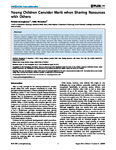Young children consider merit when sharing resources with others
| dc.contributor.author | Kanngiesser, P | |
| dc.contributor.author | Warneken, F | |
| dc.date.accessioned | 2020-06-22T11:41:09Z | |
| dc.date.available | 2020-06-22T11:41:09Z | |
| dc.date.issued | 2012 | |
| dc.identifier.issn | 1932-6203 | |
| dc.identifier.issn | 1932-6203 | |
| dc.identifier.other | 8 | |
| dc.identifier.uri | http://hdl.handle.net/10026.1/15803 | |
| dc.description.abstract |
Merit is a key principle of fairness: rewards should be distributed according to how much someone contributed to a task. Previous research suggests that children have an early ability to take merit into account in third-party situations but that merit-based sharing in first-party contexts does not emerge until school-age. Here we provide evidence that three- and five-year-old children already use merit to share resources with others, even when sharing is costly for the child. In Study 1, a child and a puppet-partner collected coins that were later exchanged for rewards. We varied the work-contribution of both partners by manipulating how many coins each partner collected. Children kept fewer stickers in trials in which they had contributed less than in trials in which they had contributed more than the partner, showing that they took merit into account. Few children, however, gave away more than half of the stickers when the partner had worked more. Study 2 confirmed that children related their own work-contribution to their partner’s, rather than simply focusing on their own contribution. Taken together, these studies show that merit-based sharing is apparent in young children; however it remains constrained by a self-serving bias. | |
| dc.format.extent | e43979-e43979 | |
| dc.format.medium | Print-Electronic | |
| dc.language | en | |
| dc.language.iso | en | |
| dc.publisher | Public Library of Science (PLoS) | |
| dc.subject | Child, Preschool | |
| dc.subject | Cooperative Behavior | |
| dc.subject | Decision Making | |
| dc.subject | Female | |
| dc.subject | Game Theory | |
| dc.subject | Humans | |
| dc.subject | Male | |
| dc.subject | Play and Playthings | |
| dc.subject | Reward | |
| dc.title | Young children consider merit when sharing resources with others | |
| dc.type | journal-article | |
| dc.type | article | |
| plymouth.author-url | https://www.webofscience.com/api/gateway?GWVersion=2&SrcApp=PARTNER_APP&SrcAuth=LinksAMR&KeyUT=WOS:000308206000064&DestLinkType=FullRecord&DestApp=ALL_WOS&UsrCustomerID=11bb513d99f797142bcfeffcc58ea008 | |
| plymouth.issue | 8 | |
| plymouth.volume | 7 | |
| plymouth.publication-status | Published online | |
| plymouth.journal | PloS One | |
| dc.identifier.doi | 10.1371/journal.pone.0043979 | |
| plymouth.organisational-group | /Plymouth | |
| plymouth.organisational-group | /Plymouth/Faculty of Health | |
| plymouth.organisational-group | /Plymouth/Faculty of Health/School of Psychology | |
| plymouth.organisational-group | /Plymouth/REF 2021 Researchers by UoA | |
| plymouth.organisational-group | /Plymouth/REF 2021 Researchers by UoA/UoA04 Psychology, Psychiatry and Neuroscience | |
| plymouth.organisational-group | /Plymouth/REF 2021 Researchers by UoA/UoA04 Psychology, Psychiatry and Neuroscience/UoA04 Psychology, Psychiatry and Neuroscience MANUAL | |
| plymouth.organisational-group | /Plymouth/REF 2021 Researchers by UoA/UoA04 Psychology, Psychiatry and Neuroscience/UoA04 REF peer reviewers | |
| plymouth.organisational-group | /Plymouth/Users by role | |
| plymouth.organisational-group | /Plymouth/Users by role/Academics | |
| dc.publisher.place | United States | |
| dcterms.dateAccepted | 2012-07-27 | |
| dc.identifier.eissn | 1932-6203 | |
| dc.rights.embargoperiod | Not known | |
| rioxxterms.versionofrecord | 10.1371/journal.pone.0043979 | |
| rioxxterms.licenseref.uri | http://www.rioxx.net/licenses/all-rights-reserved | |
| rioxxterms.type | Journal Article/Review |


